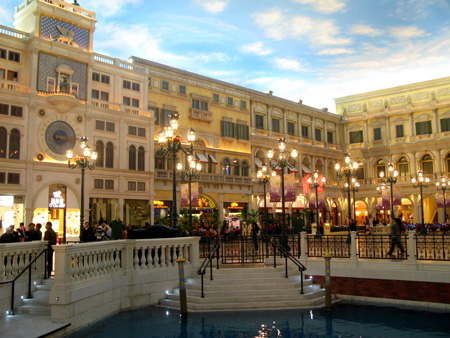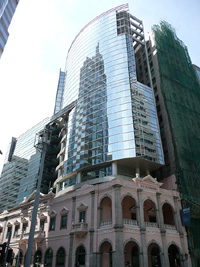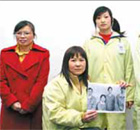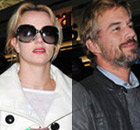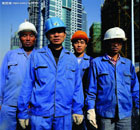The City of Macao
Economy
(gov.mo)
Updated: 2009-12-17 11:36
 |
Large Medium Small |
Overview
Though a small economy, Macao pursues an open economic policy. It boasts one of the lowest tax regimes in the Asia Pacific region and sound financial stability. As a free port and a separate tariff zone, which has no foreign exchange controls, Macao is an active player in the regional economy and a vital link between the Chinese mainland and global markets.
|
|
The Macao Special Administrative Region (MSAR) has maintained rapid growth since its establishment, with its economy growing by an average of 14 percent in real terms annually between 2000 and 2008. This is a turnaround from consecutive negative growth in the four years to 1999. Macao's gross domestic product (GDP) stood at 141.17 billion patacas in 2008 at constant prices of 2002, which is 3.1 times the 1999 figure. This translates into US$39,000 of GDP per capita in 2008 – one of the highest in Asia. As of the end of 2008, the MSAR's foreign reserves had reached 127.2 billion patacas.
Macao's small-scale economy is characterised by its openness and flexibility and enjoys a unique position in the regional economy. It used to be largely dependent on export trade, but the services sector is playing an increasingly bigger role as the processing industry tries to adapt itself to changing times.
Macao is one of two international free ports in China. Goods, capital, foreign exchange and people flow freely in and out of Macao. Since the establishment of the MSAR Government, economic policy in Macao has focused primarily on protecting and streamlining its free market economic system. It has cultivated a world-recognised, free and open, fair and orderly market environment.
In April 2007, the World Trade Organization (WTO) released a trade policy review of Macao, a study that takes place every six years. The report recognised Macao's economic achievements over the past six years and its optimistic prospects for future development, and reaffirmed the openness of its economy. This is the MSAR's second WTO trade policy review since the previous one in 2001.
According to the 2009 Index of Economic Freedom released in January by the US-based Heritage Foundation, Macao was ranked sixth in the Asia Pacific region for the first time and ranked number 21 among 179 economies globally.
Capitalising on its unique advantages, the MSAR strives to strengthen economic cooperation and develop into an international trade services platform for the region. It aims to give full play to its longstanding ties with the Asia Pacific region, the European Union, Romance language-speaking countries and especially Portuguese-speaking countries, thereby cementing its role as the bridge between the Chinese mainland and these economies.
Tourism and Gaming
The tourism and gaming industry, a general term for tourism, hotels, catering, retails and gaming, is a major driving force of Macao's economy. Gaming by itself is the largest source of direct tax in Macao.
|
|
Macao is trying to position itself as a global tourism and leisure hub. Its tourism sector will continue to diversify while consolidating its unique cultural resources. Regional cooperation will also be strengthened in a bid to promote multi-destination travel and turn Macao into a premium cultural tourism city.
Macao's visitor arrivals in 2008 hit 22.93 million. The Chinese mainland was Macao's largest source of tourists (accounting for 11.61 million visitor arrivals), followed by Hong Kong (7.02 million), Taiwan (1.32 million) and Malaysia (0.43 million). In the first 10 months of 2009, the number of visitor arrivals stood at 17.8 million, down by 7.1 percent compared with the same period of last year. Nevertheless the number of visitor arrivals has seen positive growth since August this year.
The local gaming industry's gross revenue in 2008 reached 109.83 billion patacas (equivalent to US$13.73 billion), contributing 41.9 billion patacas (US$5.24 billion) in gaming taxes to the government coffers. In the first 10 months of 2009, the gaming industry posted a total of 96.62 billion patacas (US$12.08 billion) in gross revenue.
Regional Cooperation and the Convention Industry
Strengthening external economic cooperation, developing bilateral and multilateral economic relations and intensifying cooperation among regional economies are the development strategies of the MSAR Government. With China's accession to the WTO and a new series of reforms and liberalisation, Macao has taken advantage of its unique competitive edge to develop itself into a services hub within the western region of the Pearl River Delta. Regular regional exchanges, such as the Pan Pearl River Delta (PPRD) Regional Cooperation and Development Forum that was launched in 2004, and other irregular exchanges not only enhance regional collaboration in the PPRD, but also provide an avenue for cooperation for foreign investors in the Pearl River Delta.
The MSAR Government also continues to promote economic exchanges with Hong Kong, Taiwan as well as Singapore and Japan, while giving full play to its traditional links with the European Union and Romance language-speaking countries, especially Portuguese-speaking countries, in order to further enhance its role as a bridge between the Chinese mainland and these economies.
The signing of the Closer Economic Partnership Arrangement (CEPA) between the central government and the MSAR Government in October 2003, plus the staging in Macao of the first Forum for Economic and Trade Cooperation between China and Portuguese-speaking Countries as well as the World Chinese Entrepreneurs Convention (WCEC) serve to accentuate Macao's function in linking the Pearl River Delta with Portuguese-speaking countries and overseas Chinese entrepreneurs. All participating countries of the Forum for Economic and Trade Cooperation between China and Portuguese-speaking Countries signed the Economic and Trade Cooperation Action Plan, which established the mode of cooperation between the participating countries and set up a Permanent Secretariat to the Forum in Macao in 2004. The Second Ministerial Meeting of the Forum was held in Macao in September 2006, during which the Economic and Trade Cooperation Action Plan (2007-2009) was signed.
|
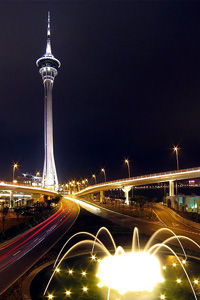 Macau Tower at night. [wikipedia.org]
|
After years of efforts, Macao's role as a services platform for China and Portuguese-speaking countries has gained further recognition and support. Bilateral trade and investments between China and Portuguese-speaking countries are fast growing. In 2007, bilateral trade reached US$46.35 billion, meeting the target of US$45-50 billion set in the Second Ministerial Meeting two years ahead of schedule. Bilateral trade in 2008 hit US$77.022 billion, a year-on-year rise of 66.16 percent.
One of the MSAR Government's top economic priorities is to spur the development of the convention and exhibition industry in a bid to achieve optimal economic diversification. The Government offers assistance and support to the staging of large international meetings and events in Macao. It also subsidises the business community in hosting various types of exhibitions and developing business travel. Through different business tourism conventions held around the world, Macao's profile in the convention and exhibition sector is also promoted.
The annual Macao International Trade and Investment Fair (MIF) has become the biggest international exhibition in the city. It has grown from 23 delegations with 206 booths in 2000 to 48 delegations with 1,074 booths in 2009. Agreements worth 4.3 billion patacas (US$540 million) were signed in the 2009 MIF, up from US$168 million in 2000.
In the first half of 2009, a total of 750 events (694 meetings and 36 exhibitions) were held in Macao, attracting 211,000 visitors.
